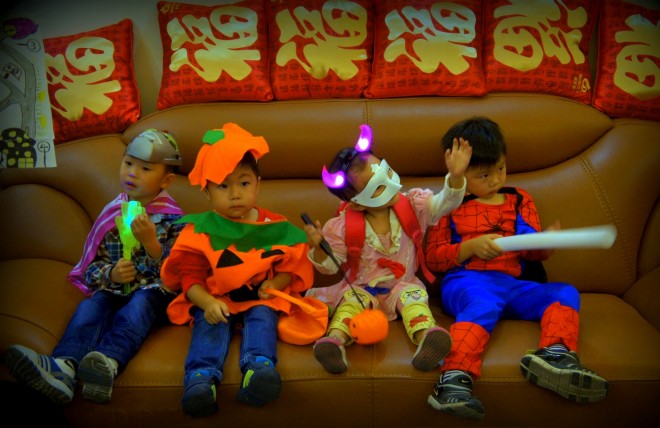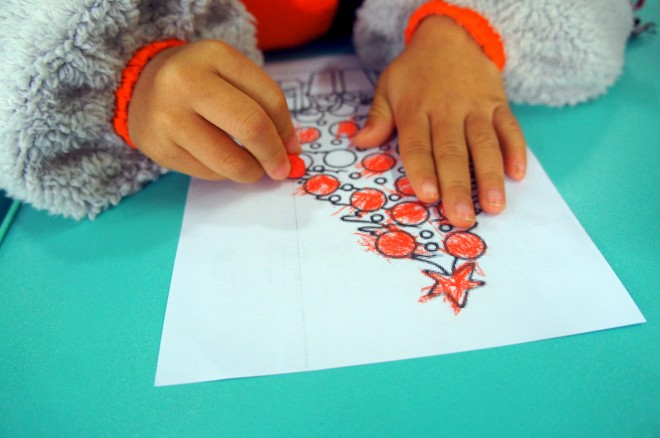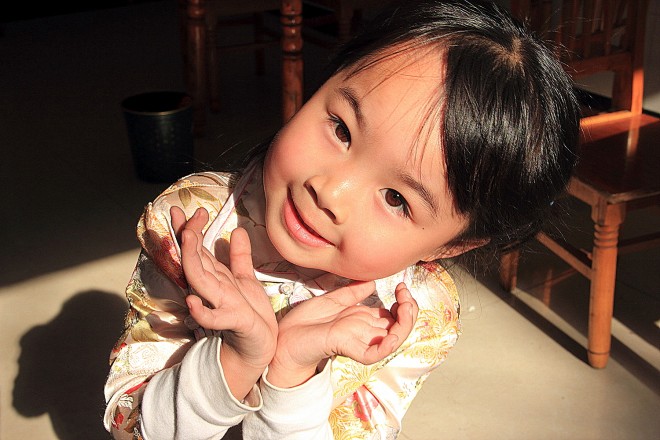Today’s post is an interview with Agness, a Polish budget traveller, baozi lover and adventure hunter, who has been living, travelling and working in China since August 2011. She is currently an English teacher in one of Dongguan’s private kindergartens. Between her work and travels, she is blogging on eTramping – a travel website where you can find plenty of budget travel tips on how to travel the world with $25 in your pocket. If you would like to read more about China, you can check out her e-book “Add the Brick to the Great Wall:” Experience-based Advice for China from Expats” which sums up her two-year experience of teaching, living and travelling in the Land of Dragons.
Hi Agness, what inspired you to teach abroad? Why did you choose China?
I always wanted to travel, see foreign places and experience other cultures. I only had a little time to explore Europe during my studies, but it was enough for me to see, that I need to go further and for longer. Few months before graduating, my Chinese friend invited me to visit her in China – it seemed so distant then. It really got me thinking seriously about it. Cez (my best friend, with whom we share etramping.com) told me that it’s possible to not only visit China for a holiday, but also to work there as a teacher. It was in line with my degree, and with my experience (I taught before in Poland and UK). It all came together and it didn’t take long to convince me that this is the right next move.
Generally speaking, native speakers of English are more employable for teaching English, as a result of this did you feel you had to work harder to land a job? What advice can you give a non-native speaker who feels they are applying against the odds?
Of course, native speakers of a language would be considered better suited to teach it. That’s as long as they are also qualified teachers. It is hard work to learn a language to the level where you can teach, and it’s also very hard to learn how to teach. Don’t feel discouraged though. If you’re good in both, you would be considered in the same way as others – based on your skills and experiences and not where you come from.
There are some major cultural differences between China and Europe; did you find it difficult to adjust to any of them?
It was quite difficult for me to get used to people either not telling me about things that directly concerned me, or telling me them just too late. Especially when it comes to classes. I have several times had to wake up at 6 am to have a class at 7:30 or 8, but was told that it’s a day off few minutes after the class should have started. It was very annoying, because I want to spend all my free time travelling. It’s not a big issue now because I think I got used to it, and I am flexible enough to pack and leave for an adventure without prior notice.
During my time in China I was shocked by the internet censorship of sites like Facebook, Youtube and many blogs. How did you get around accessing these sites when they were, and still are in many places, banned?
First of all, the censorship of certain sites in China has changed recently. Whereas before it was more to do with limiting the freedom of speech, now it has more economical grounds. Chinese people use as much social media as people from any other country. The difference is that they use their Chinese equivalents. The government still prohibits the use of some foreign websites, so that people of China make money for Chinese companies.
I use VPN to access foreign websites (we’ve been using Express VPN and Strong VPN). These are paid services, of which Chinese government is fully aware, but they receive part of the profits, so there’s no problem using it.
Can you impart any advice to someone suffering from culture shock in China?
First of all, it is perfectly normal to experience culture shock in China. You’re most likely on the other side of the world – things are supposed to be different and this is why you came here! The best advice is to take it easy and don’t stress about things. Nothing bad should happen to you, so take it all as a learning adventure. Also, talking regularly with your family and friends help to put it all into perspective.
Back to the classroom, what does an average day of teaching consist of?
It’s always the same, but never the same – at the same time. Thanks to the teaching schedule, every day is planned ahead, so I can easily prepare and do my job well. However, since I’m working with little kids (and Chinese people rarely tell me of my schedule changes in advance), every day brings something new. It all allows me to have a routine with crazy twists every day.
Do you have any amusing stories that have happened to you in the classroom?
There was one class during which one of my students touched my breast and said “Teacher, teacher, so big!” I could not stop laughing!
Haha, the innocence of youth! To what extent do you feel teaching has enriched your life?
I’m inspiring the next generation to learn and discover – what else can enrich my life more? Teaching English at Chinese kindergarten brings me closer to them, for many I’m their first encounter with a foreigner. It’s a huge responsibility and a great gift from life.

After 3 three years of living in China does speaking Chinese come quite naturally to you now? Could you speak any Chinese beforehand?
I had taken a few private Chinese classes before I came to China, but I didn’t learn much. I started to pick up words and make sentences 1 month after I arrived in China and now, after 2 years, I am pretty good at ordering food on phone, doing shopping at local supermarkets or expressing different feelings when having a chat with Chinese locals.
Finish off this sentence: “I feel happiest when…”
I feel happiest when I hear my little Chinese students say “Hello teacher! How are you today?” every morning!
Doesn’t she just make your heart melt?
Finally, what advice can you give someone who is thinking about teaching English in China?
Well, there’s so much advice that I would like to give – there won’t be enough space for it here. This is also the most common question asked of me. This is why me, Cez and Sarah Bennett have written a book dedicated to those who think or plan on teaching in China. It’s called Add Your Brick to the Great Wall and you can find it on Amazon.
To keep up-to-date with Agness you can connect with her on Twitter and Facebook.












15 Responses
Thank you so much Shing for having me here. I can’t stop smiling when seeing photos of my cute and adorable students here. Teaching English is China has been one of the best experiences in my life. I not only learned how to deal with kids, but also how to teach, have fun and feel like one of them! 🙂
Thanks so much for this interview Agness! Feeling like one of them is definitely one of the greatest things about teaching children – I’m trying to hold onto that childhood wonder. I feel the same way as you, teaching English in China is up there as one of my life’s best experiences.
Hi Agness, Shing, I am 35 and really interested in teaching in china. I don’t have a BA degree and no teaching experience, but want to do the TEFL course via i-to-i as they offer includes, accommodation and jobs! But this sounds too good to be true and I’m trying to find out loads of info before I do accept as I don’t want to scammed! Cause I’ll be leaving a stable job in South Africa to go and chase my adventure spirit while finding myself and still give of myself to children! So ja, the risk is great, but also exciting at the same time!
So my question is, is there any other way in getting there without degree and whether these recruiters are legite!
I googled language exchange program and homestay came up, not to sure whether shing was refering to that aswell as one of the options to enter china!
Kindly give me any feedback that u think I might need and also people to contact and websites!
Can’t wait on your reply, agness and shing
Regards
Channy G
Cute post!
Oh, also, Agness, I was going to ask – did you ever have any problems with children’s behaviour whilst teaching in China? Or are the kids mostly sweethearts?
It depends. Most of them are so sweet and well-behaved, but there are also some monsters who disturb my class, kick me or bite me (no joke). They are some aggressive kids around who fight with each other, but I always report this kind of behavior to the principle and parents.
Oh my god! I loved the interview (and Agness and Cez’s blog) 🙂 but the children are just too adorable! Incredible pictures!!!
I know Pam, these photos are amazing,I love all their expressions! The one of the little girl cupping her face just melts my heart!
Thank you so much Pam! They are amazing and so cute!!!
Teaching these children must be fun. They look so cute and adorable. 🙂 Teaching English is a fabulous opportunity. I also think about it sometimes, but as you say native speakers get the first preference. Do they consider hiring Indians?
It’s a lot of fun and they do look adorable. Would you like to try it one day? If so, let me know!!
Hello there Shing! Interesting article and a lovely blog. It was definitely one of the things I was considering a few years ago when I wanted to take a gap year…..and I am sure there is still a big market for teaching English in a foreign country. Have a lovely weekend!
May x
http://www.walkinginmay.com
Hi May! Teaching English abroad is a great experience for anyone wanting to take a gap year or simply to experience new challenges and experiences. I’m glad you liked the interview and hope you’re having a fabulous weekend!
Teaching to children can be fun but I also think it’s very handwork and you really must be a patient person with the passion for teaching otherwise it can be very stressful. It looks like you’ve doie more than well Agness! 🙂
I completely agree Franca – hard work, patience and passion are basic requirements for teaching, especially if you want to have the kind of relationship with your students that Agness clearly has!